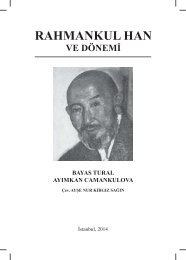THE SOVIET HISTORIOGRAPHY AND THE QUESTION OF KAZAKHSTAN’S HISTORY
SOVYET-TARIH-YAZICILIGI-ENG
SOVYET-TARIH-YAZICILIGI-ENG
Create successful ePaper yourself
Turn your PDF publications into a flip-book with our unique Google optimized e-Paper software.
62<br />
<strong>THE</strong> <strong>SOVIET</strong> <strong>HISTORIOGRAPHY</strong> <strong>AND</strong><br />
revolt. Thereby, his point of view did not change the interpretation<br />
that ‘Kenasari played a progressive role in the independence movement<br />
of the Kazakh people in 1837-1846’. 80<br />
To the critical ideas about the involvement of Kazakhstan with Russia<br />
and the progressive character of the riot in 1837-1846, H. Aydarova, S.<br />
Tolıbekov, T. Şoyunbayev, B. Süleymenov, and some other historians,<br />
he answered: ‘Some historians from the Kazakh SSR Science Academy<br />
(H. Aydarova, S. Tolıbekov, T. Şoyunbayev, B. Süleymenov) did not<br />
accept the progressive character of Kazakh people revolt between<br />
the years 1837-1846. This makes a discharge of colonialism policy of<br />
Tsarist Russia. We need to truely understand the progressive quality of<br />
Kazakhstan’s involvement to Russia. The importance of the progressive<br />
quality is not being allies with Tsarist Russia of the Kazakh khans but<br />
with Kazakhstan benefits’ matching up with the developed economy<br />
of Russia and the progressivism of Russian culture. Its importance is<br />
that Kazakh laborers having the opportunity to fight with the common<br />
enemies against the governing class by taking the leadership as<br />
an example with the oppressed class of Russia. When it is looked<br />
upon this way, nobody ignores the importance of the Kazakh people<br />
independence revolt’s progressive quality that emerged from Tsarist<br />
government and Middle Asia Khan colonial policy.’ 81<br />
In K.Şaripov’s article, ‘Let Kazakhstan History Be Told Through Marxist<br />
Doctrine’ in the periodical ‘Socialist Kazakhistan’, it was also claimed<br />
that ‘Some comrades do not accept the revolts between the years<br />
1837-1846 as a public upheaval and as having progressive sides by also<br />
making true criticisms about the book during the debates at the Kazakh<br />
SSR Science Academy’ and the historians H. Aydarova, S. Tolybekov,<br />
T. Shoyunbayev, and B. Suleymenov’s mistaken views were criticized.<br />
Third Period<br />
T. Shoyunbayev who did not find K.Şaripov’s article adequate, which<br />
was issued at the same time in some of press organs like “Voprosy<br />
İstorii” (no.4), “Bolşevik Kazahstana” (no.9) magazines and “Socialist<br />
Kazakistan” and “Kazakhstanskaya Pravda” in 1949. Even as Şaripov<br />
declared some criticisms about the personality and the behavior of H.<br />
Aydarova and A. Yakunin, and observed that “Kenesari Kasimov took the<br />
leadership of the revolt as he tried to discharge.” Şaripov’s article did<br />
not help to solve the issue that occupied Kazakh historians. Because<br />
of this, E. Bekmakhanov’s mistakes were associated with other studies<br />
as well. An article was issued in the newspaper ‘Pravda’ under the<br />
80 Ibid.<br />
81 Ibid.



